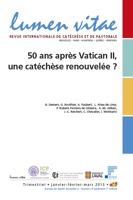 previous article in this issue previous article in this issue | next article in this issue  |

|
Document Details : Title: La conversion et le devenir chrétien Author(s): SOULETIE, Jean-Louis , LACROIX, Roland Journal: Lumen Vitae Volume: 68 Issue: 4 Date: 2013 Pages: 413-422 DOI: 10.2143/LV.68.4.7000005 Abstract : Selon la consitution conciliaire Dei Verbum, conversion et foi sont indissociablement liées. Cette constitution lie également conversion et assentiment à la vérité (§ 5). On le constate chez les catéchumènes qui, découvrant la foi, découvrent peu à peu que leur conversion ne va pas sans consentement à recevoir la vérité comme don. Leur cheminement se nourrit alors d'une connaissance de Dieu qui s'inscrit dans un processus confinant au combat spirituel. Car la conversion/nouvelle naissance trouve sa source dans la dynamique de Pâques. Aujourd'hui où la transmission de la foi est en crise, il est temps de réfléchir à nouveaux frais à cette exprérience de la conversion, notamment en «rethéologisant» cette notion. According to the constitution Dei Verbum of the Second Vatican Council, conversion and faith are inextricably linked. This constitution also connects conversion to the ascent of truth (§ 5). We see this among catechumens, who, as they discover faith, gradually realise that their conversion is not possible without consenting to receive truth as a gift. Their journey is thus nourished by a knowledge of God that is part of a process that borders on spiritual combat. For conversion/rebirth finds its source in the dynamism of Easter. As the gospel narratives of Jesus' resurrection appearances show, which describe the reorientation necessary for conversion as the fruit of an encounter with the Risen One. Baptism and Christian initiation are thus naturally aspects of conversion, both as regards the rites (notably the scrutinies) and in terms of the baptismal catechesis offered during the catuchumenate. Today, when passing on the faith is in crisis, it is time to reflect afresh on this experience of conversion, and in particular by 'retheologising' the concept. |
